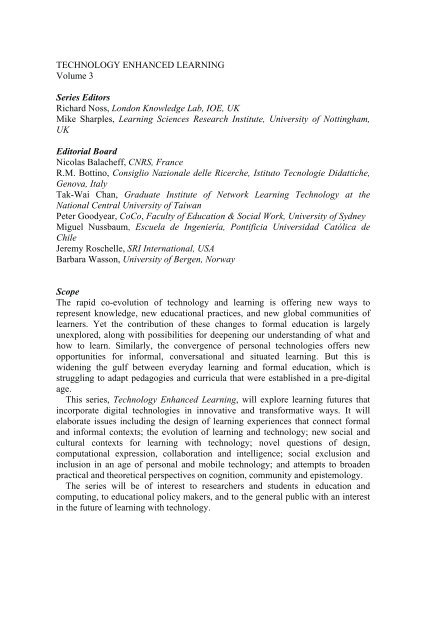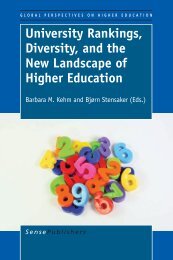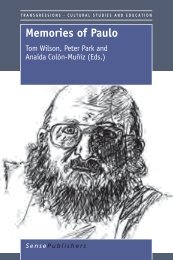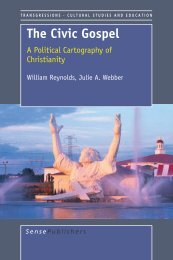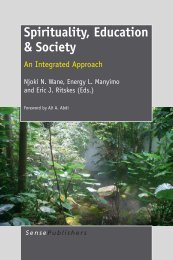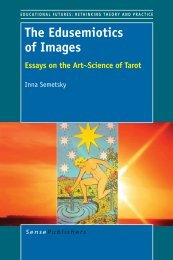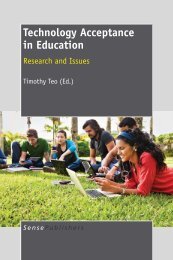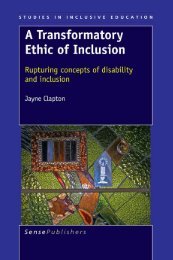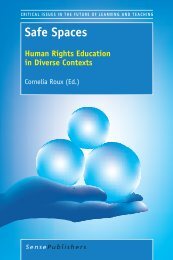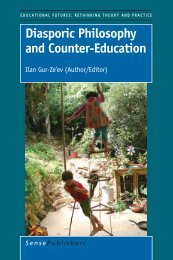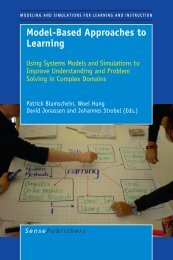Classroom of the Future - Sense Publishers
Classroom of the Future - Sense Publishers
Classroom of the Future - Sense Publishers
Create successful ePaper yourself
Turn your PDF publications into a flip-book with our unique Google optimized e-Paper software.
TECHNOLOGY ENHANCED LEARNING<br />
Volume 3<br />
Series Editors<br />
Richard Noss, London Knowledge Lab, IOE, UK<br />
Mike Sharples, Learning Sciences Research Institute, University <strong>of</strong> Nottingham,<br />
UK<br />
Editorial Board<br />
Nicolas Balacheff, CNRS, France<br />
R.M. Bottino, Consiglio Nazionale delle Ricerche, Istituto Tecnologie Didattiche,<br />
Genova, Italy<br />
Tak-Wai Chan, Graduate Institute <strong>of</strong> Network Learning Technology at <strong>the</strong><br />
National Central University <strong>of</strong> Taiwan<br />
Peter Goodyear, CoCo, Faculty <strong>of</strong> Education & Social Work, University <strong>of</strong> Sydney<br />
Miguel Nussbaum, Escuela de Ingeniería, Pontificia Universidad Católica de<br />
Chile<br />
Jeremy Roschelle, SRI International, USA<br />
Barbara Wasson, University <strong>of</strong> Bergen, Norway<br />
Scope<br />
The rapid co-evolution <strong>of</strong> technology and learning is <strong>of</strong>fering new ways to<br />
represent knowledge, new educational practices, and new global communities <strong>of</strong><br />
learners. Yet <strong>the</strong> contribution <strong>of</strong> <strong>the</strong>se changes to formal education is largely<br />
unexplored, along with possibilities for deepening our understanding <strong>of</strong> what and<br />
how to learn. Similarly, <strong>the</strong> convergence <strong>of</strong> personal technologies <strong>of</strong>fers new<br />
opportunities for informal, conversational and situated learning. But this is<br />
widening <strong>the</strong> gulf between everyday learning and formal education, which is<br />
struggling to adapt pedagogies and curricula that were established in a pre-digital<br />
age.<br />
This series, Technology Enhanced Learning, will explore learning futures that<br />
incorporate digital technologies in innovative and transformative ways. It will<br />
elaborate issues including <strong>the</strong> design <strong>of</strong> learning experiences that connect formal<br />
and informal contexts; <strong>the</strong> evolution <strong>of</strong> learning and technology; new social and<br />
cultural contexts for learning with technology; novel questions <strong>of</strong> design,<br />
computational expression, collaboration and intelligence; social exclusion and<br />
inclusion in an age <strong>of</strong> personal and mobile technology; and attempts to broaden<br />
practical and <strong>the</strong>oretical perspectives on cognition, community and epistemology.<br />
The series will be <strong>of</strong> interest to researchers and students in education and<br />
computing, to educational policy makers, and to <strong>the</strong> general public with an interest<br />
in <strong>the</strong> future <strong>of</strong> learning with technology.


